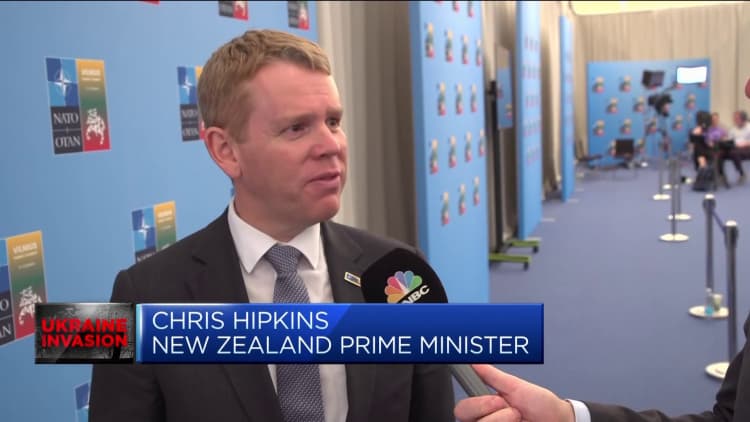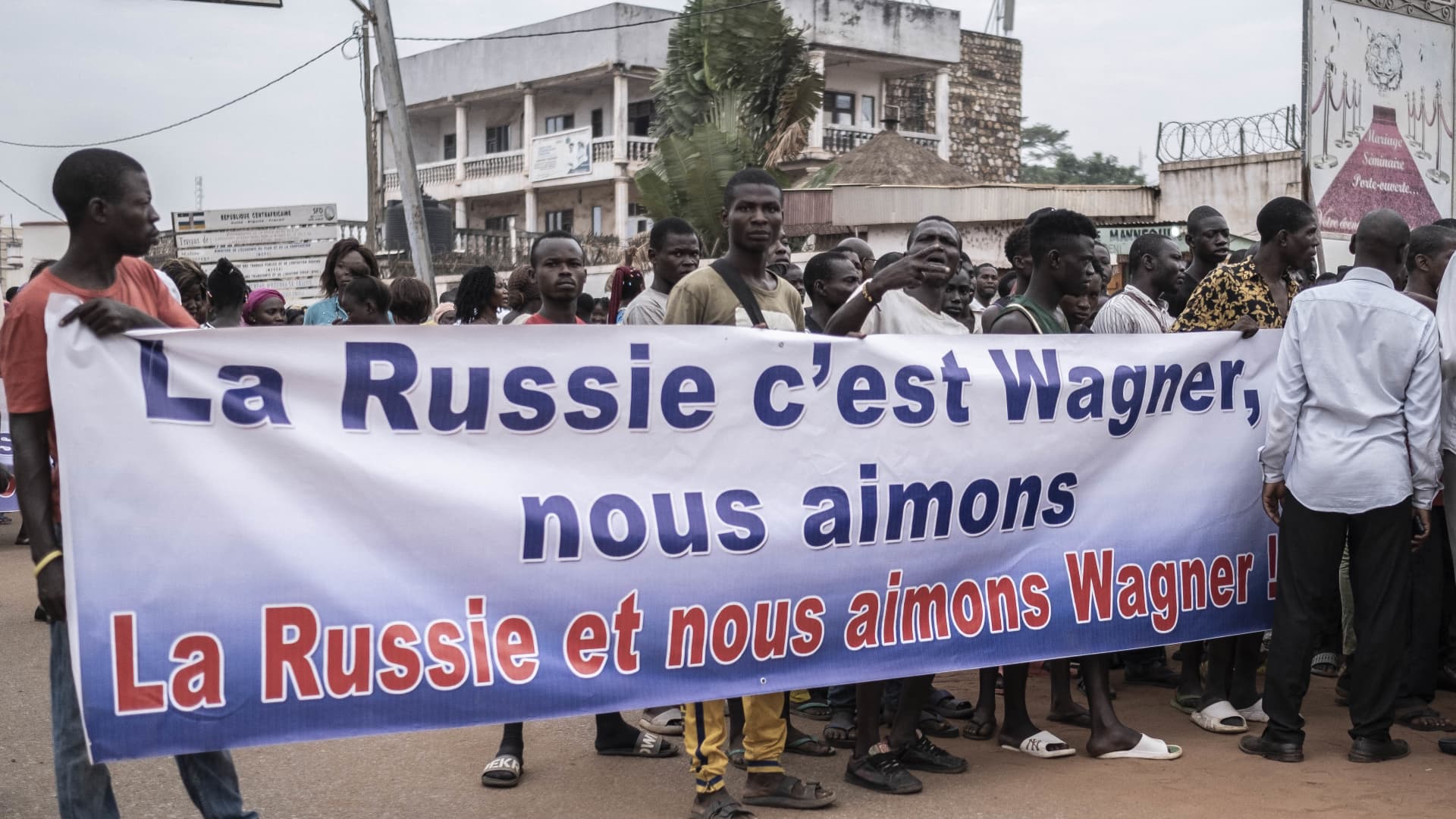BANGUI, Central African Republic – March 23, 2023: Demonstrators carry banners in Bangui, on March 22, 2023 during a march in support of Russia’s presence in the Central African Republic. Taking advantage of the vacuum created by the departure of the bulk of French troops, Moscow sent “military instructors” to the country in 2018, then hundreds of Wagner paramilitaries in 2020 at the request of Bangui, faced with a threatening rebellion.
BARBARA DEBOUT/AFP via Getty Images
Since the Wagner Group’s aborted rebellion against the Russian military late last month, a cloud of uncertainty has hovered over the mercenary force’s operations around the world.
The Wagner Group, a paramilitary unit founded by Yevgeny Prigozhin in Russia, is known for both brutality and effectiveness in its role as a private mercenary contractor with close ties to the Kremlin, often popping up on conflict-ridden states to help fragile governments repel armed insurgencies.
Its fighters have played a key role in Russia’s full-scale invasion of Ukraine, securing crucial territories in some of the conflict’s bloodiest battles to date. But the group also has a significant presence elsewhere in the world — not least in Africa.
Hundreds of Wagner troops were spotted last week departing from Bangui, the capital of Central African Republic (CAR), where the Kremlin-linked group has its largest and broadest overseas presence.
It comes just weeks after Wagner boss Prigozhin embarked on an ill-fated rebellion in Russia, ordering his troops fighting in Ukraine to march toward Moscow.
The mutiny ended with a deal brokered by Belorussian leader Alexander Lukashenko that saw Prigozhin seemingly exiled to Belarus, but a lack of clarity has ensued over his whereabouts.
Meanwhile, Wagner’s chain of command has been called into question, with the Kremlin attempting to re-establish its control over the previously allied mercenary force.
Russian President Vladimir Putin suggested that mercenaries who were not involved in the mutiny may be offered the opportunity to sign contracts with the Russian armed forces, rather than handing over their arms. Sky News reported Friday that the Wagner personnel who left CAR had refused to sign new these contracts.
It remains unclear whether the exodus of Wagner personnel in CAR last week was related to a routine rotation of troops, a refusal to sign contracts, or a Moscow-ordered withdrawal designed to curb Prigozhin’s empire.
However, the Officers’ Union for International Security (OUIS), a U.S.-sanctioned Wagner front company operating in CAR, announced over the weekend that a fresh wave of fighters had arrived in the CAR capital of Bangui.
“The planned rotation continues. Several hundred experienced professionals from the Wagner company are joining the team working in CAR,” the OUIS said in a statement on Telegram.
“Russian instructors will continue to aid soldiers in the Central African armed forces to ensure security in anticipation of the constitutional referendum scheduled for July 30.”
Whatever the reason for the rotation, Alex Vines, director of the Africa Programme at Chatham House, told CNBC on Wednesday that the number of troops departing “seems higher than normal.”
Chris Weafer, CEO of Moscow-based Macro-Advisory, noted that Prigozhin appears to have reached an “understanding” with the Kremlin. “He will not again threaten the regime, and in exchange, he can remain free to manage his business interests and, possibly, to continue managing Wagner,” he told CNBC.
Weafer suggested that Wagner, or some variation of it, will “continue to be useful for the Kremlin” in several countries in Africa, adding that it is “unlikely they will again operate in eastern Ukraine.”
“It is a very Russian solution to what is essentially an internal power dispute,” he added.
The ‘pro-Russian state’ experiment in Africa
Over the past six years, Wagner has established a significant presence on the African continent, both militarily and in terms of political and economic influence, serving as an important vehicle for Russia to expand its diplomatic and economic interests.
Mercenary activities have been confirmed in CAR, Sudan, Libya, Mali and Mozambique, but Chatham House’s Vines noted that only in the CAR has Wagner been able to establish an all-encompassing military, economic and political presence.
Wagner entered CAR in 2018 at the request of President Faustin-Archange Touadéra to protect the government and lucrative mines against armed rebels amid an ongoing civil war. The group’s influence has since expanded to include the mining of gold and other natural resources.
It proved an opportune moment for Moscow, which saw the potential to expand its geopolitical reach as France began to loosen ties to its former colonies in Africa.
Vines noted that the Kremlin had initially planned to build on its warm relationship with former Sudanese dictator Omar al-Bashir to establish a pro-Russian, geostrategically significant state, until the Bashir regime was overthrown in a military coup in 2019.
It was then that Wagner’s presence in CAR, and Touadéra’s growing dependence on the mercenary force, took on additional importance.
“Originally, [the Russians] saw it as an extension of their ambition to use Sudan as a big platform with Al-Bashir — and have a big corridor going through — but then Al-Bashir collapsed, but they continued on experimentation on how to create a pro-Russian state in Africa, which is what I think we have in the Central African Republic,” Vines explained. The Russian foreign ministry has been contacted for comment by CNBC.
CAR has since become a vehicle for Russia’s ambitions in Africa, however a divisive referendum at the end of the month — called by Touadéra in an effort to override the country’s constitution and run for a third term in office — will offer a stern test of its efforts to prop up the government against a backdrop of widespread conflict and human rights abuses.
Wagner itself has been accused by numerous international bodies of perpetrating human rights abuses in CAR, including the torture and killing of civilians, though it maintains a strong public image in the country of having successfully quashed violent rebel uprisings at the government’s behest.
New challengers
French President Emmanuel Macron met with Touadéra in Gabon in March, with many commentators suggesting both parties wish to see CAR, which gained independence from France in 1960, diversify its international partnerships away from what has become a heavy dependence on Russia.
As well as Western efforts to rebuild ties with CAR and other African nations in which Wagner has a presence, Putin and Prigozhin may also begin to face challenges from other African forces such as Rwanda, Vines noted.
Rwandan President Paul Kagame earlier this year signed an agreement to provide security services in Benin, and also visited Guinea, while Rwandan forces have been active in repelling militant factions in northern Mozambique.
Although Rwandan forces have proven “disciplined and effective” in their more distant security partnerships, they have also been linked to atrocities perpetrated by Kigali-backed M23 rebel groups in the eastern Democratic Republic of Congo.

These have included summary executions, rape, forced recruitment of civilians and a litany of alleged war crimes, according to various human rights groups, and Rwanda’s support for M23 has taken the country to the brink of war with its vast but unstable neighbor. The Rwandan government has denied supporting the rebels.
During his state visit to Benin, Kagame also took shots at the West over its attempts to persuade African states not to engage with Russia and China.
“Those who come to Africa you hear people complain about China, then about Russia, but how about them? What right do they have to be in Africa that others don’t have?” Kagame told a joint press conference with Beninese President Patrice Talon.
“What we need to do in Africa is to be together, to identify what we need in terms of partnerships and who offers what we need.”
Wagner revenue
Another cloud on Wagner’s horizon is its future revenue stream, particularly given its tense relationship with Moscow following the rebellion.
Putin has previously confirmed that the group receives Kremlin funding, and has been subsidized by Moscow to the tune of $1 billion, but Vines suggested this was primarily directed toward its operation in Ukraine.
While Russian government funding may have helped Wagner establish itself in CAR, Vines noted that the group had several years to fully entrench itself in the economy and start generating its own revenue, as part of the broader experiment of creating a “pro-Russian state.”
If brought under the Kremlin’s umbrella during a costly ongoing war, that government funding is more likely to be diverted toward the war effort in Ukraine, while any Wagner commercial activity will need to generate quick returns.
The state-backed, gradual expanse seen in CAR will not therefore be replicable anywhere else in Africa, Vines suggested, because “there just isn’t the pocket and the strategic patience for it that the Russians had” back in 2018.

